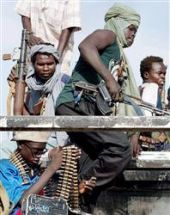INTERVIEW-U.S. warns rebels to curb attacks in Darfur
By Arshad Mohammed
WASHINGTON, Oct 29 (Reuters) – The United States is increasingly worried about attacks by rebel groups in Darfur even as Sudan seems to be reining in militias on the other side of the conflict, a senior U.S. official said on Friday.

|
|
SLA rebels prepare to patrol the village of Muhajiriyah in rebel-held South Darfur, Sudan, October 23, 2004. |
Two rebel groups launched an uprising against Khartoum in early 2003 and accused the government of arming Janjaweed Arab militiamen to loot and burn villages in the western region in a spasm of violence the United States has called genocide.
U.S. officials have long focused their criticism on the government, accusing it of supporting the Janjaweed and taking part in violence that has displaced more than 1.5 million people and, according to the United Nations, killed an estimated 70,000 people from disease and malnutrition.
Charles Snyder, the U.S. special envoy for Sudan, said Sudan was making some efforts to respect the cease-fire and to curb the Janjaweed and that he was more worried that the Sudan Liberation Movement (SLM) and Justice and Equality Movement (JEM) rebel groups were continuing to launch attacks.
“While we’re not happy with how much and how fast the government is doing, they are taking action,” Snyder said in an interview, saying the scale of Janjaweed attacks has diminished significantly. “The government is trying to rein them in.”
“The issue is no longer … are huge numbers of people being displaced, massively butchered, are the helicopter gunships flying every day,” he said, adding he could argue that “the Janjaweed are now suppressed into activities that they think they can get away with because nobody’s watching.”
REBEL ACTION
“What I find more disturbing is that many of the incidents that are happening now are (as a result of) rebel action,” he added. “The SLM and the JEM have been fairly provocative in their activities … and we are actually warning them that their best behavior is required in this process as well.”
The United States on Thursday airlifted 50 Nigerian troops to Darfur, the first of 3,000 extra African Union soldiers deployed to monitor the shaky Darfur cease-fire. Washington hopes the presence of the troops, whose mandate is to protect AU observers, will further reduce attacks by both sides.
Jemera Rone, a Sudan expert with Human Rights Watch who visited Darfur this month, said the government had not cracked down on the Janjaweed and said one reason the attacks had diminished is that there are fewer people left to displace.
“I don’t think they are trying to rein in anybody,” she said. “If you are saying attacks are down, that does not mean everything is OK and people can go home … The aim is reversing the ethnic cleansing and allowing them to go home.”
Rone said Snyder’s comments about the rebels seemed designed to pressure them to adopt a more conciliatory stance at deadlocked talks between government officials and rebels in the Nigerian capital Abuja.
Rebels have refused to sign a humanitarian accord to allow more aid to refugees, insisting that it be signed together with a security pact that would disarm the Janjaweed.
“What is underlying this is the need to bring pressure on the rebels at the bargaining table,” she said, saying the rebels “are not in a hurry to settle … partly because they feel the international community is on their side because all the criticism has been directed at the government.”
Snyder said that his main objective at the Abuja talks was to get the April 8 Darfur cease-fire to hold, saying a political settlement was a longer term objective but less immediately pressing than the need to stop the violence.
“If the violence is still going on, the political discussion to some degree is pointless” he said, saying both sides might use attacks to influence the talks and simply produce more bloodshed.
